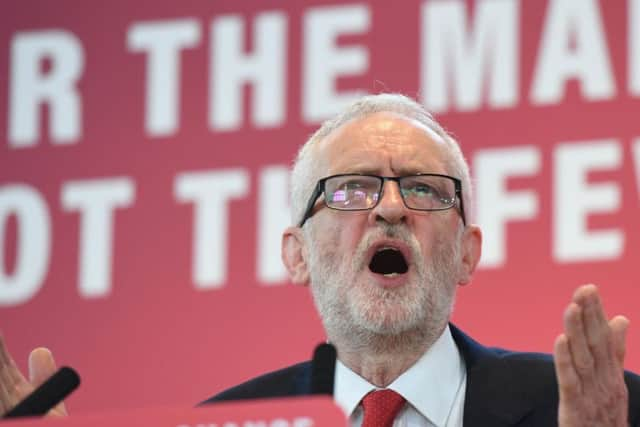Will Labour grant an IndyRef2 if Jeremy Corbyn enters Downing Street?
Richard Leonard will today officially launch Scottish Labour's 2019 general election campaign in Glasgow, the city that was once the party's impregnable citadel.
If Jeremy Corbyn is to stand a real chance of becoming prime minister next month, he needs to retain the seven constituencies north of the Border won by candidates wearing red rosettes in 2017.
Advertisement
Hide AdAdvertisement
Hide AdNot so long ago, young Labour MPs like Paul Sweeney in Glasgow North East, and Danielle Rowley in Midlothian, would have been touted as the future of the party. Instead, both could be looking for new jobs come December 13.


Scottish Labour cannot afford to be complacent in any constituency. It is being squeezed on three fronts - from the relentless SNP election-winning machine, a re-energised Lib Dems, and the firm Union defenders in the Scottish Conservatives.
Both the Tories and the Lib Dems view Labour as being soft on the issue of Scottish independence. We would never allow an IndyRef2, they tell voters. Can Labour say the same?
UK party priorities
Mr Leonard and many activists in Scotland are sincere when they patiently explain, for the umpteenth time, that there has already been a referendum on independence and there is no need for another. But that doesn't mean Mr Corbyn will not grant one anyway.
The UK Labour party knows it is unlikely - on current polling, anyway - that it will win an outright majority on December 12. A more realistic route to power is to rely on the votes of pro-Remain parties. But the Lib Dems insist they don't want to see Mr Corbyn in Downing Street. Which leaves the SNP.
A good night for the Nationalists on December 12 could see it return 40 or more MPs. Add to that number a handful of Plaid Cymru members, and at least one Green, and Labour is looking at a useful voting block to ensure Boris Johnson is sent to the opposition benches.
Senior UK Labour figures, including shadow chancellor John McDonnell, believe they have a rare window of opportunity to push through the kind of transformative policies they think are required to tackle widening income inequalities and a growing housing crisis. The prospect of five more years of Tory government is one they are desperate to avoid.
Is promising an IndyRef2 to the SNP - to be held sometime after 2020 - a price worth paying to ensure the Conservatives are kept out of Downing Street? Many Labour members in London sincerely believe it is, even if they won't say so publicly in as many words.
Advertisement
Hide AdAdvertisement
Hide AdThey are effectively gambling that once voters in Scotland see what a Labour government can do at Westminster, and the kind of policies it implements, support for independence will fall.
Nicola Sturgeon has said she doesn't want a formal coalition with Labour in the Commons. That's fine, as Labour doesn't want one either. A so-called supply-and-confidence deal - in which the SNP could back Labour on an issue-by-issue basis - is more likely.
An awkward position
All of this leaves Scottish Labour in an awkward position. Journalists, understandably, routinely ask Mr Leonard what his thoughts on such horsetrading are. Will he rule out an IndyRef2? Would he support a deal with the SNP? The party can struggle to get it domestic policies heard as a result.
And every time Mr Corbyn mentions independence, the Tories and Lib Dems view it as an opportunity to pull more floating voters towards them. The Conservatives have built a large part of their revival in Scotland on positioning themselves as no-nonsense defenders of the Union. There are many former Labour voters who are simply fed up of the independence debate.
Perhaps Labour will win a majority in the Commons, and the votes of SNP MPs will suddenly seem a lot less important. Or perhaps Nationalist and Labour activists in Scotland - for so long sworn enemies - will find themselves supporting the same Westminster Government.
